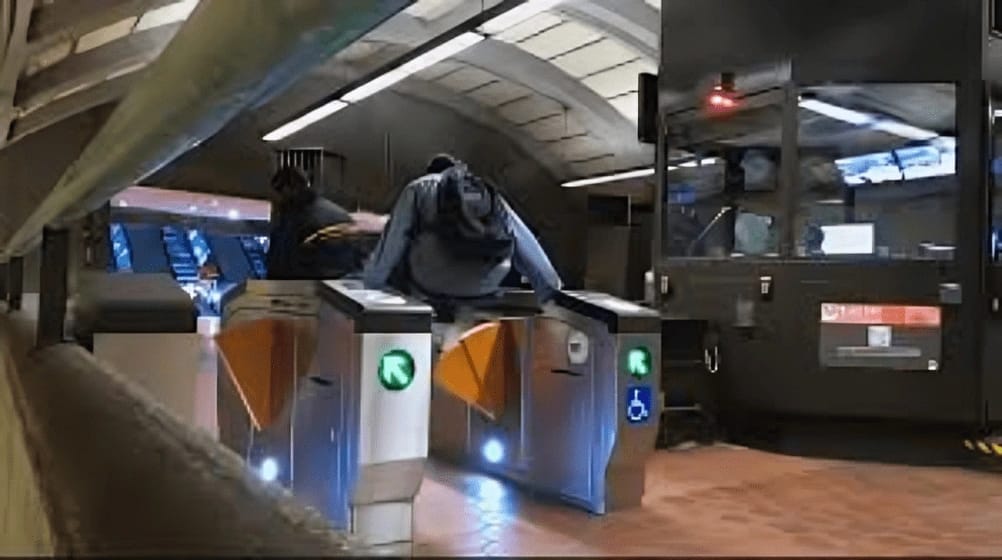In a concerning incident, the Washington Metropolitan Area Transit Authority (WMATA) issued a public warning after a man managed to evade paying his fare and tragically fell onto the metro tracks. This unsettling event has prompted both public concern and renewed scrutiny over the safety of the region’s metro system, which serves millions of passengers daily.
The WMATA operates the Metrorail and Metrobus systems throughout the Washington D.C. metropolitan area, providing essential transportation services to commuters, tourists, and residents alike. However, as with any large transit system, safety concerns, particularly those related to fare evasion and track incidents, can have serious consequences. This latest incident highlights the potential dangers that passengers face when attempting to evade fares, as well as the vulnerabilities of the metro system in managing these situations.
The Incident
According to reports from WMATA, the incident occurred during the early morning hours at one of the metro stations on the Metrorail Red Line. The man, whose identity has not been disclosed by authorities, was observed attempting to evade paying his fare at the station’s turnstiles. Fare evasion has been a longstanding issue for many transit systems, including WMATA, and it often results in significant financial losses for the authority. However, in this instance, the consequences of fare evasion took a much darker turn.
As the man bypassed the fare gates, he reportedly stumbled and fell onto the tracks while attempting to cross the platform to board the train. This is not an isolated incident, as there have been previous reports of passengers falling onto tracks after evading fares or trying to cut corners to make their way through the system. Fortunately, in this case, the metro train was not in immediate proximity to the man, and emergency responders were able to reach him quickly. However, the incident raises serious concerns about the safety of both fare evaders and other passengers using the metro system.
Safety Concerns and WMATA’s Response
In response to the incident, WMATA quickly issued a public warning, urging passengers to remain vigilant and always follow the proper safety procedures when using the metro system. WMATA spokespersons highlighted the risks involved when passengers attempt to bypass fare gates or engage in unsafe behavior on platforms and near train tracks.
“We cannot stress enough the importance of safety when using the Metrorail system,” said a representative from WMATA. “We understand that people may sometimes be in a rush or try to avoid paying the fare, but such actions can have severe consequences, as seen in this recent incident.”
In addition to urging passengers to be more cautious, WMATA also highlighted the importance of public awareness campaigns designed to address the growing issue of fare evasion. While fare evasion itself is a serious problem, the act of bypassing fare gates can also lead to unsafe behaviors, as passengers may attempt to cut through restricted areas or engage in risky actions near platforms or train tracks.
The agency emphasized the need for improved security measures to deter such behavior. Some proposals have included the installation of more advanced fare enforcement technologies, such as fare gates with heightened security features, surveillance cameras, and the presence of security personnel. These measures could not only reduce fare evasion but also mitigate the risks associated with dangerous incidents like the one that occurred.
Impact on WMATA’s Operations
The fallout from incidents like these extends beyond just the immediate safety concerns—they can also affect the broader operations of the metro system. When a passenger falls onto the tracks, there are often delays in train service, as authorities and emergency responders work to safely remove the individual from harm’s way. The disruption to service can affect thousands of commuters, resulting in delays, overcrowded trains, and a general reduction in the efficiency of the transit system.
Moreover, ongoing issues with fare evasion can lead to increased costs for the transit authority. Fare evasion means lost revenue, and over time, it can impact the financial stability of the system. According to WMATA’s most recent financial reports, fare evasion has been a persistent issue that contributes to millions of dollars in lost revenue each year. While the agency has made efforts to address this problem, incidents like this highlight the continued challenges of ensuring both safety and financial sustainability.
The financial burden of fare evasion and the associated risks can lead to budgetary pressures, which may affect funding for other crucial areas, such as maintenance, staffing, and infrastructure improvements. This creates a vicious cycle, where both operational efficiency and safety are compromised.
Fare Evasion as a Growing Problem
Fare evasion has become a growing concern for transit authorities across the United States, and WMATA is no exception. In 2021, a report from WMATA indicated that fare evasion accounted for approximately $40 million in lost revenue each year. This loss has been exacerbated by the COVID-19 pandemic, which disrupted ridership patterns and led to significant financial challenges for many transit systems. In many cases, the pandemic increased reliance on contactless fare payments, which, while reducing the risk of virus transmission, also made it easier for individuals to evade paying for their rides.
To address this issue, WMATA has implemented various strategies to reduce fare evasion, including increased fare inspections, automated fare gates, and educational campaigns to raise awareness about the importance of paying for rides. However, enforcement remains a challenge, especially as the transit authority works to balance security concerns with the comfort and convenience of passengers.
The dilemma of fare evasion is multifaceted. While some individuals may avoid paying due to financial hardship or perceived inequities in the fare structure, others engage in fare evasion simply to save time or avoid paying altogether. Regardless of the motivations, the consequences can be severe, as evidenced by the recent incident on the Red Line.
Moving Forward: Ensuring Safety and Security
In the wake of this unsettling incident, WMATA will likely continue to explore ways to enhance safety across its transit system, focusing not just on the prevention of fare evasion but also on reducing the risks posed by dangerous behaviors. As metro systems continue to grow in size and complexity, ensuring that both passengers and staff are safe will be an ongoing priority.
The incident also serves as a reminder to the public of the importance of adhering to safety guidelines when using public transportation. The risks of evading fares and engaging in unsafe behaviors near train tracks should not be underestimated. In addition to the risks of physical harm, the safety of other passengers is also at stake, as one person’s dangerous actions can create a ripple effect that affects many others.
As WMATA works to prevent future incidents and address the ongoing issue of fare evasion, passengers will need to do their part by following safety protocols and being mindful of the potential dangers present within the metro system. Only through collective awareness and responsibility can public transportation systems like WMATA continue to provide safe and reliable services for all.





